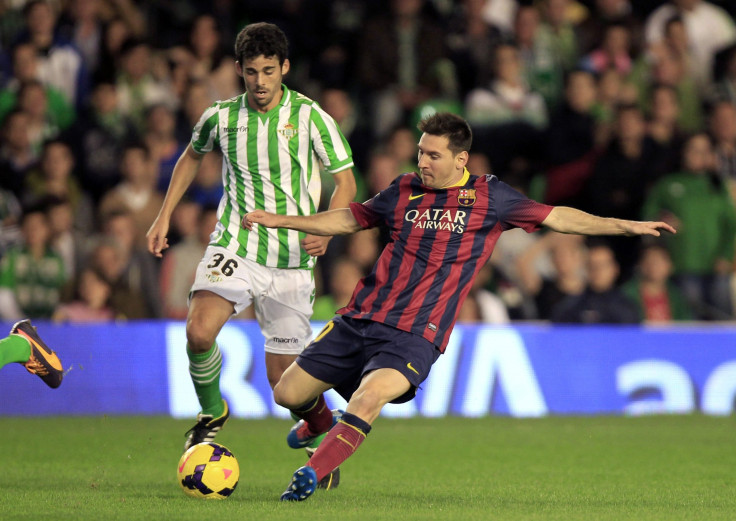Lionel Messi Injury: Why Barcelona Star’s Hamstring Tear May Turn Out To Be A Blessing

There was a sense of heavy inevitability when Lionel Messi limped off the Benito Villamarin pitch after 21 minutes against Real Betis on Sunday. The precise timing or place, of course, could not have been foreseen, but another injury, another muscular injury, most certainly could.
For so long, Messi’s incredible talent was matched by his once frail physique being transformed under Pep Guardiola into a seemingly unbreakable body that meant that he could play unrelenting for 60 games a season. This year, though, he has had a series of nagging muscle injuries. None ruled him out for any significant length of time, but perhaps they should have kept him out for longer. He was rushed back for the second leg of Barcelona’s Champions League quarter final against Paris Saint-Germain in April and came off the bench to inspire an equalizer that saw his side progress on away goals.
Arguably, he has not looked right since. Having been present yet absent for the humiliating semifinal defeat to Bayern Munich, the Argentine should have had a long rest. Instead, he played throughout the summer, often in showcase friendlies, in four continents, racking up around 56,000 air miles in the process. Now, forced by his body rather than choice, he will finally get his rest.
For that reason, Messi’s hamstring tear could ultimately turn out to be a positive for the player, his club and, in a World Cup year, his country.
Messi could have continued playing for the rest of the season and still been one of the world’s best, but at the start of this season he has lacked that extra magic -- the zip over the first two yards to burst away from players -- that makes him arguably the best the world has ever seen. The injury, providing he recovers properly, gives him the chance to come back and return to his best.
That will clearly benefit Barcelona. And, while they won’t admit it, if they were to pick a time to be without Messi for two months, it would be in this particular season and at this particular time. When Messi was missing last season, Barcelona were lost. The team had unsurprisingly come to revolve around him to such a degree that, despite having some of the world’s best players, they were mere ordinary in his absence.
Sensing that, Barcelona pushed to ensure that the long-inevitable signing of Neymar would happen this summer rather than after the World Cup. The Brazilian provides an "X factor," another player that can open up stubborn defenses with a moment of magic. And he has started his Barcelona career superbly, adopting to Barcelona’s team ethic, while maintaining glimpses of the individual brilliance. Neymar has already been carrying the team to large extent as Messi has struggled. Manager Gerardo “Tata” Martino deserves huge credit too for, for the first time since his big-money move from Udinese, getting the best out of the talented Alexis Sanchez.
Those two, along with Cesc Fabregas, are capable of maintaining the team’s results in Messi’s absence. Yet the fact is that in the next two months, Barcelona do not have a major match. Having just played and beaten their big domestic rivals Real Madrid, and with a three-point lead in La Liga, Barcelona also ensured their place in the knockout stages of the Champions League last week. With the current prognosis of a six to eight week absence, Messi should be back for their next big test against second-placed Atletico Madrid on Jan. 12 and could well be back up to full speed by the time the Champions League resumes in February.
After that, the mid-season break could well enable Messi to be fresher than most when he could enshrine his legacy as the greatest of all time at the World Cup with Argentina.
© Copyright IBTimes 2025. All rights reserved.





















